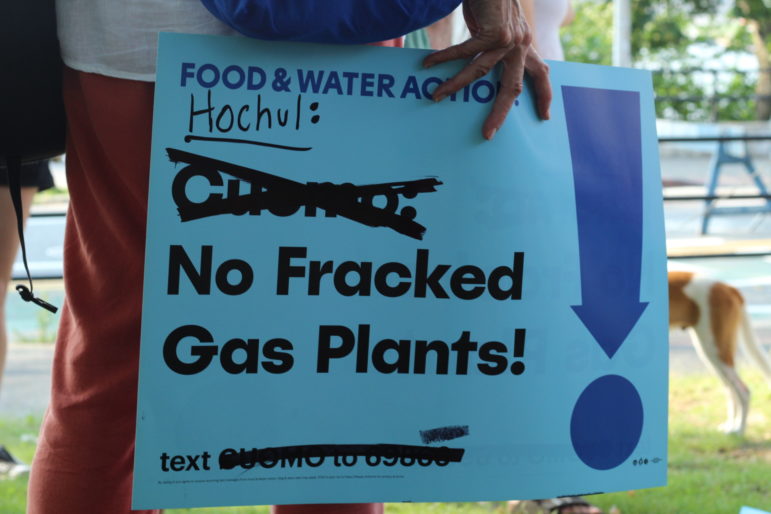“The Climate Action Council Scoping Plan for New York must not allow for new or repowered gas power plants that pollute our air and endanger community health. Additionally, the final plan must set a 2024 deadline for all electric new building construction and a similar 2027 deadline for bigger buildings.”

Liz Donovan
A protestor holds a sign at a rally opposing the NRG power plant proposal in Astoria on Thursday.Climate change isn’t just knocking at the door, it is inside the house. Now, every action we take—here in New York and elsewhere—to hasten the transition to clean energy and meet our climate goals will lessen the current and future consequences of a warming planet.
To further spark global drive and dedication to this cause, New York City is currently hosting its fourteenth annual Climate Week. Leaders from across sectors, states, and nations have convened here to celebrate steps already taken to combat climate change and to brainstorm more solutions.
Already, New York has been a leader in the move away from fossil fuel dependence and towards renewable energy. The Climate Leadership and Community Protection Act (CLCPA), signed in July 2019, marked a turning point in the state’s fight for healthier communities and a greener grid. The law mandated a 40 percent reduction in greenhouse gas emissions from 2005 levels by 2030 and an 85 percent reduction by 2050. It also sets deadlines for 70 percent renewable energy by 2030 and zero-emissions electricity by 2040.
New Yorkers want to do their part in solving the climate crisis. According to a recent poll, nearly 70 percent of New York voters believe climate change is a problem and want policies that address extreme weather events like floods and heat waves. Of those voters surveyed, 63 percent also support the CLCPA, while less than a third oppose it. The majority, 68 percent, would also like New York to step up and lead the global charge toward clean, renewable energy.
While the CLCPA goals are ambitious and vital, targets are only just the beginning. New York must put in motion an equally purposeful plan to reach its climate goals. To do this, the CLCPA directed that the state produce a roadmap, the Climate Action Council Scoping Plan. In January, the 22 member Climate Action Council, led by members of the Hochul administration, released a draft of the scoping plan for public comment. Since the draft’s release, stakeholders and community members statewide have made impassioned pleas for climate action that marches us towards decarbonization, sets clear year-by-year targets, and ensures a just energy transition for all.
In the face of this public support for climate action and leadership, national fossil fuel lobbying groups have attempted to bend reality toward their own interests. Opposition groups have argued against policies that improve health in frontline communities and add up to 200,000 building sector jobs in the coming two decades. This flies directly against the wishes of the majority of New Yorkers. Two thirds of recent poll respondents reported wanting a CLCPA that ensures low-income communities and communities of color benefit. An overwhelming 93 percent of those surveyed also want policies that create new, local jobs.
Local leaders must stand up to opposition from fossil fuel interest groups and advocate for the greener grid and cleaner air New Yorkers want and need. The way to do that is by supporting a bold and just Climate Action Council Scoping Plan. To be a true global leader in decarbonization, the final scoping plan must not allow for new or repowered gas power plants that pollute our air and endanger community health. Additionally, the final plan must set a 2024 deadline for all electric new building construction and a similar 2027 deadline for bigger buildings. Year by year targets for new renewable energy sources are also required to ensure a smooth transition off dirty fossil fuels.
Climate week is a time for thinking up solutions and acting on them. Soon, members of the New York City Council will have the opportunity to lead in these efforts when they hear testimony and later vote on Council Resolution 169, a public showing of support for the draft scoping plan. The City Council cannot miss this chance to, on behalf of eight million people, speak out in favor of ambitious statewide climate action.
New York City is at the forefront of the climate crisis. The impacts of rising sea levels, severe tropical storms, and precedent-setting heat waves are felt across all boroughs and in every neighborhood. We cannot remain unmoved as the climate continues to endanger our neighbors and damage our infrastructure. New York must lead ourselves out of this crisis and set the example for cities and communities across the world.
Ramón Cruz is president of the Sierra Club.







